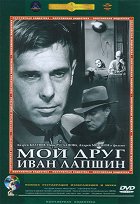Directed by:
Aleksey GermanScreenplay:
Eduard VolodarskiyCast:
Нина Русланова, Andrey Mironov, Semyon Farada, Aleksandr Filippenko, Нина Усатова, Yuriy Kuznetsov, Valeriy Filonov, Aleksey Zharkov, Sergey Kushakov (more)Reviews (2)
This film is definitely not about uncovering the obvious or hidden faces of Stalinism, but rather about gaining insight into the life of police investigator Lapshin and his friend - and yes, insight into the 1930s, but I would rather not draw complex judgments about this time period from this film. It's not so much about the time period but about a person. A person searching for happiness and security in the face of a harsh and insensitive world that he knows from his everyday work and his past life (and here, the "time period" plays a role). A person whom we are waiting to see if friendship and love will finally help him emerge from loneliness. Despite the mostly black-and-white camera and the omnipresent Russian winter and gloom that engulfs the viewer (and despite the somewhat disorganized first half), the film creates a nostalgic, sensitive, and perceptive atmosphere, best illustrated by the opening scene of the people getting to know each other when the camera familiarly examines and passes through a series of details in the narrator's story (the son of Lapshin's friend) while leaving the "big" outside world behind his windows.
()
Of Alexei German's last three films, one is shot from the position of a stranger in a civilization on a strange planet (Hard to Be a God) and two as a memoir of an old man's childhood (this one and Khrustalyov, My Car!). Leaving aside the fact that these last two films confuse the viewer by, among other things, posing as the director's autobiography (which neither of them is), it offers these jumping-off points as an ideal starting line in the effort to navigate the uneasy narrative form that characterizes German's films. His stories are told not only in purely subjective terms, but through the distant lens of a child who doesn't fully understand the confusing adult world unfolding around him. All of this is further combined with the fact that much of the story was told to the narrator only later by his father, who was not even present for most of the events depicted. The first shot of the film, in which the camera pans across paintings, photographs, and artifacts of the narrator's apartment, offers the final pieces to the puzzle that makes up the story. Rarely do German's films combine the unreliability of memory along with its interpretation, but he nevertheless offers it as a way of coming to terms with a distant period that’s not easy to grasp. Anyone who, as a child, listened quietly to the dialogue of drunken parents and their friends, however they misunderstood it, will better understand how and what this film is about.
()
Gallery (16)
Photo © Lenfilm Studio


Ads